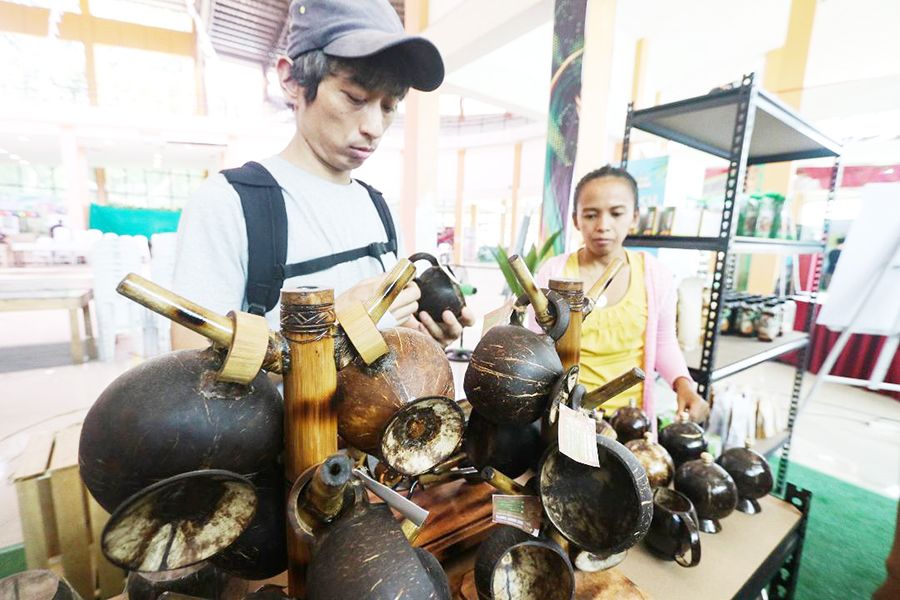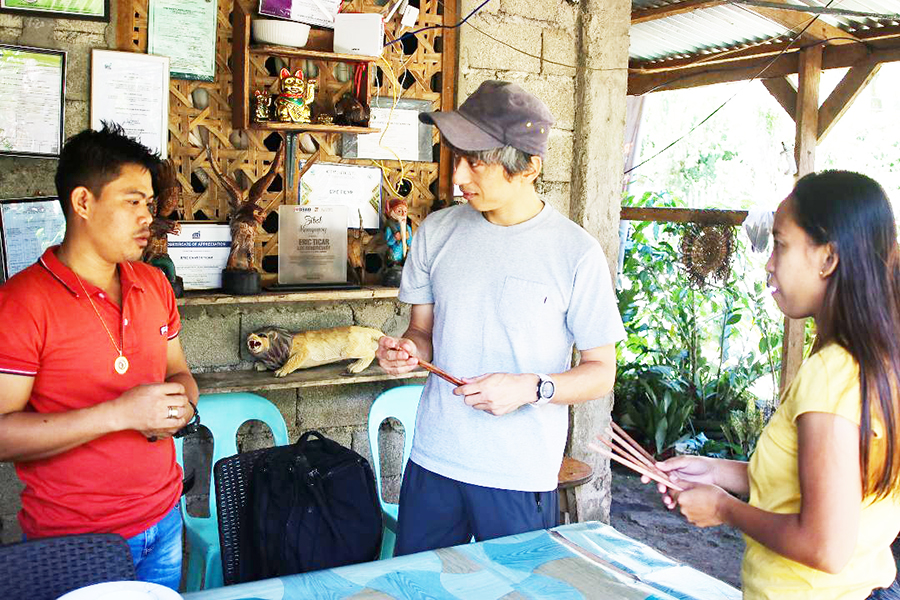Japanese firm seeks to expand collaboration with Filipino coconut farmers
KIDAPAWAN CITY – A Japanese company, which has been working with Filipino farmers for nearly 20 years, is seeking to import more innovative coconut-based food products and handicraft items in different parts of the Philippines.

YU Mizui checks one of the coconut shell handicrafts in Kidapawan City. (Keith Bacongco)
Cocowell, an Osaka-based company, has been producing and selling assorted coconut-based products since 2004 with a mission to help small coconut farmers in the Philippines.
While Cocowell has already established business partnership with at least 12 coconut farmer groups in the country, founding director Yu Mizui recently visited several coconut farmers in Davao del Norte and North Cotabato to explore for further collaboration.
Mizui met Eric Ticar, who produces a variety of handicraft products that are mostly made of coconut shells at his shop in this city in North Cotabato.
The Japanese entrepreneur said that he had learned about Ticar’s products through the Philippine Coconut Authority (PCA).
During his visit to Ticar’s shop in Barangay Kalasuyan, the craftmaker demonstrated before Mizui how he makes chopsticks using his available power tools.
Ticar also showed some of his works to the Japanese entrepreneur such as ladles, spoon, fork, food bowls, lampshades, and other souvenir items.
In 2014, Cocowell used to import chopsticks produced by farmers in Leyte. However, the production was halted due to logistical problems, Mizui recalled.
“A lot of my customers are still looking for the coconut chopsticks. Besides, we are using chopsticks every day. That is why I’m interested in reviving the chopstick products,” he pointed out.
Mizui said he has asked Ticar to produce few samples of chopsticks first and then they will evaluate in Japan before closing the deal.
He added that chopsticks made of coconut sticks are more durable than the common bamboo sticks.
Ticar, a former resort worker, admitted that he is looking forward for a possible partnership with Cocowell.

CRAFTMAKER Eric Ticar (left) chats with Yu Mizui during Muzui’s visit to Kidapawan City. (Keith Bacongco)
‘Sari-sari’ store in Osaka
In Osaka, Cocowell runs a shop known as “sari-sari” or community convenience store which he derived after the small neighborhood sundry stores across the Philippines.
The store features a variety of coconut-based food and health products such as virgin coconut oils, coconut sugar, coconut ice cream, premium coconut oil, coco curry, coconut milk powder, vegan cheesecake, coco soap, coco lip balm, and even “lambanog” or coconut wine.
Mizui said all the sweet food products are sweetened by organic coco sugar, adding that all raw materials for their products are imported from different coconut farmers in the Philippines.
The coco sugar, he said, is produced by Health Sweets, a certified organic coco sugar producer based in Panabo City, Davao del Norte.
The virgin coconut oils are produced by ProSource International in Quezon province.
Mizui is also importing coconut milk from Davao del Norte and General Santos City and coconut milk powder from Quezon.
Tree of life
Mizui learned about the potentials of coconut when he took up environmental science in Benguet in 2002.
As part his studies, he visited the Smokey Mountain landfill in Tondo, Manila.
“I saw a lot of people picking trash for living in that very poor environment,” he recalled. “So I felt that the coconut could be one of the solutions to help these poor people alleviate from poverty without going to urban areas.”
Thus in 2004, Mizui founded Cocowell with the aim to specialize on coconut products. “By increasing the value of coconuts, I could create an industry in rural areas and contribute to the stable lives of farmers,” he said.
In their website, Cocowell states that their mission is to pursue the infinite possibilities of coconuts and convey the appeal of coconuts to as many people as possible.
“We would like to continue to contribute to everyone's healthy eating habits and solve the poverty problem in the Philippines, including coconut farmers,” it added.
Aid for typhoon survivors
Aside from providing a market for the Filipino coconut farmers, Cocowell has provided assistance to typhoon-hit areas in Eastern Visayas.
Along with donors from Japan, Cocowell donated 55 houses for typhoon “Odette” survivors in Limasawa Island in 2021.
Cocowell built 70 houses for coconut farmers and fisherfolk in Libagon town in Southern Leyte.
Early this year, Mizui said he visited housing projects in these areas.
Passion for coconut
Mizui visited the showcase of various agricultural and handicraft products at Amas Capitol Grounds here.
The event is one of the highlights of the ongoing Kalivungan Festival in North Cotabato.
Among the products he was interested to test in Japan is the coconut wine produced by TreeLife, a coconut product company based in Carmen, North Cotabato.
“We wanted to learn more about it especially its health benefits,” Mizui said after testing a cup of the wine.
He also visited women craftmakers in Kapalong, Davao del Norte to check their handwoven baskets made of coconut midribs.
Mizui also dropped by the factory of coco coir and coco peat, a soil made from the pith of coconut husk.
He added that he wanted to see if coco peat can be used in urban gardening in Japan.
Every year, he goes around the Philippines several times to explore for innovative coconut products that they can sell in Japan.
The Japanese entrepreneur said he is planning to expand his products and services if there are innovative products that might interest their customers.
As a manifestation for his passion in promoting coconut products, Mizui name his children Coco and Nut. “We named them Coco (boy) and Nut (girl) because coconut is very healthy, econ-friendly, and of course, I love coconut.”